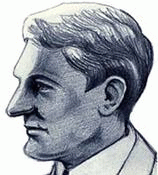Willis Carrier
One year after earning a master's degree in Electrical Engineering from Cornell University in 1901, Willis Haviland Carrier (1876-1950) developed and patented the world's first modern air conditioner. Carrier's invention not only provided comfort at home, but also allowed for the controlled conditions necessary in many environments: industrial and scientific (as for the production of many chemicals and pharmaceuticals) and even artistic (as with the protection of fine art at museums).
Before Carrier's invention, cooling systems were merely elaborate methods of ventilation (although some progress had been made – for example, by Lewis Latimer in 1886). But Carrier, with his "Apparatus for Treating Air" (patent #808,897), created a mechanical means to control both temperature and humidity, as well as the cleanliness and circulation of air. Carrier's air conditioner used a low-pressure, centrifugal system to take in air through a filter then pass the air over coils containing a stable, non-toxic coolant. The cooled and dehumidified air was directed into the living or work space, while the warm air circulating around the machines motor was vented outdoors. Still today, the technology underlying Carrier's invention (his "Rational Psychometric Formulae" of 1911) forms the scientific basis of all work done in the industry he created.
Carrier continued to refine his theories and his products, receiving several more patents along the way. In 1915, with $35,000 in capital, he co-founded Carrier Engineering Corporation, which is the world's largest manufacturer of climate control equipment today. Carrier's air conditioner is an invention without which, on a very practical level, it would be difficult for us to imagine everyday life.
Read more about Carrier here.


